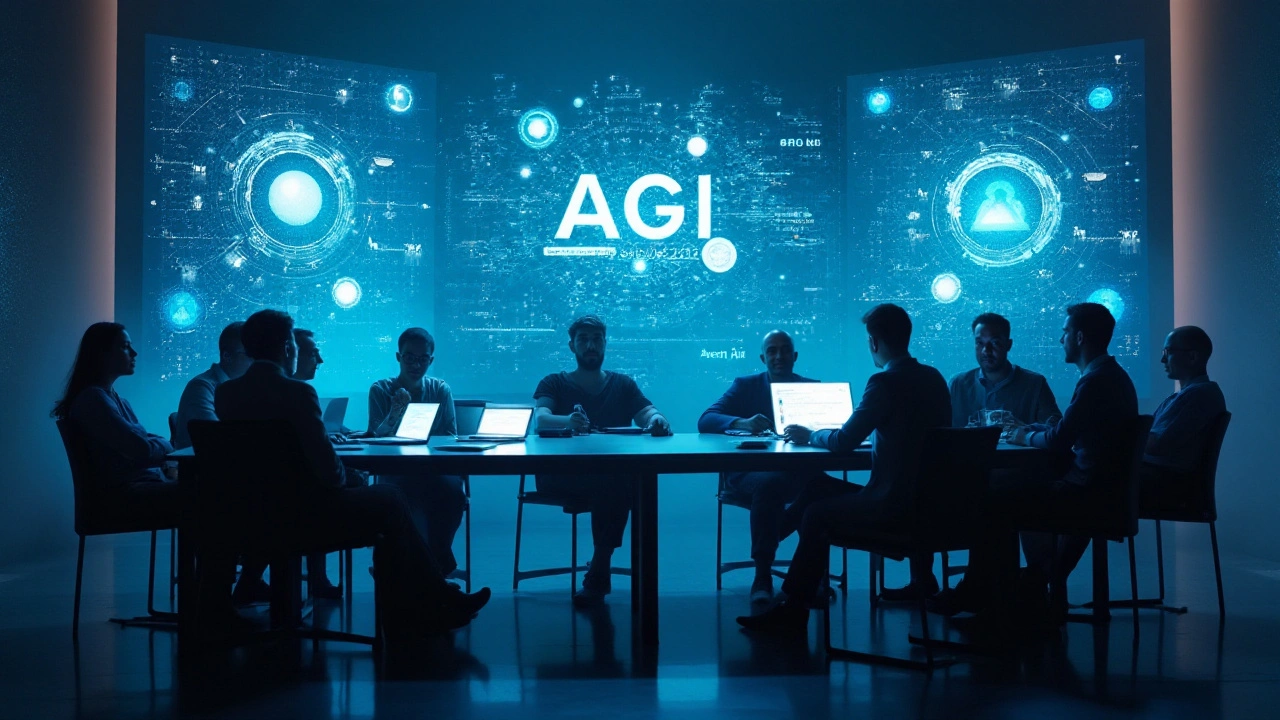Understanding the Future: Artificial General Intelligence

In recent years, discussions around Artificial General Intelligence, or AGI, have gathered momentum as researchers and technologists explore new frontiers of artificial intelligence. AGI is not just a buzzword; it stands as the Holy Grail of AI development. Unlike its narrower cousins, AGI aspires to emulate human-like cognitive functions, offering the potential to stretch AI’s capabilities across a broad range of tasks.
Imagine a machine that independently understands, learns, and applies knowledge just like humans do. This leap in technology could open doors to advancements that today seem like science fiction. As we inch closer to achieving this milestone, understanding the implications of AGI on our everyday lives and the world at large becomes more critical. Through comprehensive exploration, we can prepare ourselves for the exciting, albeit challenging, journey ahead.
- Defining Artificial General Intelligence
- Potential Impacts on Society and Industries
- Ethical and Security Challenges
- Preparing for an AGI Future
Defining Artificial General Intelligence
As the conversation around artificial intelligence pervades various facets of our lives, understanding the nuances of Artificial General Intelligence becomes paramount. AGI aspires to reach the Holy Grail of AI technology: machines that possess the kind of broad capabilities typically reserved for human intelligence. Today, most machines operate under what is known as narrow AI, specializing in specific tasks, such as playing chess or recognizing faces. In contrast, AGI strives to extend these abilities to a wider range of cognitive tasks, making machines adept at intellectual activities like reasoning, problem-solving, and adapting to new circumstances.
The intriguing journey towards AGI involves not just piecing advanced algorithms together but weaving in elements of machine learning where the AI learns and improves itself without explicit programming. The dream—perhaps fear—of AGI is crafting AI that can reason, plan, and engineer solutions effectively across multifaceted domains. Imagine an AI that can move fluidly from diagnosing a medical condition to drafting complex legal documents with equal competence. This vision of AGI is what distinguishes it from the narrow task-oriented systems operational today. Development in this area is often guided and inspired by recommendations from thought leaders including institutions like OpenAI, which famously stated,
"The path to AGI, we believe, can increase the economic efficiency and create enormous social benefits across sectors."
Essential Characteristics of AGI
The primary aspect that marks AGI is its autonomy to learn and adapt, integrating a continuous self-improvement process. It includes an understanding, or simulation, of human-like abstract thought, allowing AGI to not only process diverse information sources but also to interact with them meaningfully. Consider how humans analyze literature; we don't just read—we interpret, extract themes, and sometimes draw parallels with our own lives. AGI aims to replicate this depth of interaction with materials. To quantify this understanding, researchers often cite a machine’s ability to pass various iterations of the Turing Test as a benchmark. Moreover, studies indicate that we would need AGI systems to align closely with human intent, requiring an intricate balance between advanced decision-making and ethical deliberation.
Development in the AGI domain covers many layers—from enhancing hardware capabilities to refining software processes that enable flexibility and adaptability in rapidly changing environments. The techniques often intersect with technological advancement in neural networks and cognitive computing models. By utilizing vast datasets, these advanced systems aim to better simulate the human brain’s neural architecture, enabling machines to approach the holographic nature of human cognition. Understanding the complexity of the challenge, it's clear why AGI is seen as a paradigm shift in the technological domain, and its realization is often projected to unfold over decades rather than years.
The Pathways Toward AGI
Achieving AGI involves a strategy often touted as an iterative, incremental improvement process. This strategy includes overcoming vital hurdles like causality understanding, representation learning, and multidisciplinary integration. Laboratories and research teams globally employ varied methodologies, aiming to instill cognitive capabilities in machines. From reinforcement learning, which mimics the way humans learn through reward-based systems, to meta-learning strategies where AI systems learn to learn, the avenues are countless. By establishing rich connections across diverse AI components, scientists are weaving an intricate tapestry, leading potentially to a machine with intelligence paralleling human capability. History tells us that leaps in technological innovation often follow periods of quiet, relentless exploration—a pattern that remains true in the quest for AGI.

Potential Impacts on Society and Industries
The advent of Artificial General Intelligence is set to revolutionize both society and various industries in profound ways. At its core, AGI is designed to replicate the versatile cognitive functions of the human mind, enabling machines to perform a wide range of tasks that require understanding and learning. This could potentially lead to a world where machines help solve complex problems, work seamlessly alongside humans in creative tasks, and handle mundane duties with flawless efficiency.
Industries across the board stand to gain immensely from the development and deployment of AGI. In healthcare, for instance, AGI could lead to unprecedented advancements in patient care by providing real-time analyses of medical data, offering diagnostic support, and even identifying potential health risks before they become critical. The implications for the finance sector are equally thrilling; AGI might enable enhanced predictive analytics, fraud detection, and automated customer service, which could transform the day-to-day operations in banking and investment.
The impact on society, however, goes beyond technological improvement in specific sectors. The introduction of AGI has the potential to reshape the global economy by altering how employment is defined. There is a growing concern about job displacement as AGI could take over tasks currently performed by humans, particularly repetitive and labor-intensive roles. Yet, this technological shift could also spur new job opportunities that align with the evolving digital landscape, fostering creativity and innovation. Historical patterns suggest that technological progress often leads to a net positive effect on employment, albeit transitioning through phases that require retraining and skill adaptation.
"The potential of AGI in automating work processes can both pose challenges and create opportunities for redefining human roles in the workplace," stated John Smith, a renowned futurist and author.
A significant societal concern hinges on the ethical dimension of AGI. As these intelligent systems become integral to everyday life, questions arise regarding decision-making autonomy. Evolving policies and frameworks that govern AGI's application must be put into place to safeguard against misuse and to address privacy concerns. Experts emphasize the necessity of maintaining transparency and accountability, ensuring that AGI works for the benefit of humanity as a whole.
In educational sectors, AGI holds the promise of personalizing learning experiences, adapting to individual strengths and weaknesses, and nurturing talents. This could democratize education by making it accessible, tailored, and efficient, bridging cultural and economic divides on a global scale. The role of educators may pivot towards facilitators of deeper understanding rather than traditional teaching roles, marking a shift in educational paradigms. Such a transformation is supported by data that shows increased student engagement and retention when artificial intelligence tools are integrated into learning environments. The potential benefits of AGI demonstrate the promise and responsibility that come with such a technological leap, urging society to balance human values with the burgeoning capabilities afforded by advanced intelligence systems.

Ethical and Security Challenges
The advent of Artificial General Intelligence presents us with not only exciting opportunities but also formidable ethical and security challenges. As we stand on the precipice of this technological evolution, it becomes crucial to explore these challenges deeply, as they will undoubtedly shape the path we tread in integrating AGI into our lives. One major concern arises from the inherent capability of AGI systems to act autonomously in a variety of scenarios. Machines empowered with cognitive intelligence akin to that of humans can make decisions that potentially impact lives and the environment in unforeseen ways. The level of independence offered to such technology demands rigorous ethical considerations, especially regarding accountability when machines make mistakes or maliciously deviate from their intended purposes.
Experts argue that transparency in the decision-making processes of AGI technologies is vital in ensuring they function within the bounds of societal norms and ethics. This transparency allows stakeholders, including developers, users, and regulatory bodies, to understand and possibly rectify the processes leading to a specific outcome. However, the challenge lies in decoding the intricate neural networks and algorithms that power AGI systems. Ashton Stevens, a renowned AI ethicist, once remarked,
"We are creating systems that learn like a child yet reason like an adult — and much like educating children, the ethical onus is on us to guide them properly."As Stevens pointed out, without thorough understanding and oversight, even minor errors in AGI operations could spiral into larger, more impactful issues.
Moreover, the question of security within AGI technologies cannot be sidelined. With the monumental potential of AGI to be deployed across sensitive applications like national security, healthcare, and autonomous vehicles, the risk of hacking and data breaches becomes a significant concern. Malevolent actors could potentially exploit AI's capabilities, turning an advanced tool meant for innovation into a dangerous weapon. Therefore, robust security measures are non-negotiable, requiring innovative approaches to mitigate such risks. Building resilient AGI systems demands collaboration across different sectors and disciplines, ensuring comprehensive strategies that anticipate diverse security threats.
In addition to security, the displacement of human roles in the workforce by AGI poses ethical dilemmas that society must confront. As AGI systems become increasingly adept at executing complex tasks, the risk of job automation heightens, threatening livelihoods and economic stability for many. This potential for disruption necessitates proactive approaches to workforce adaptation, including reskilling and upskilling initiatives that prepare the labor market for coexistence with AGI technologies. Governments and private sectors must collaborate to create a balanced landscape where humans and machines work symbiotically, leveraging AGI to amplify human potential rather than replacing it.
Ultimately, addressing the ethical and security challenges of AGI requires openness and foresight. Stakeholders need to engage in continuous dialogues, fostering a collective understanding of the problems and opportunities that lie ahead. Through ethical frameworks, regulatory policies, and interdisciplinary collaboration, we can navigate these complexities. The ultimate goal is to ensure AGI is developed and integrated ethically, enhancing human progress while upholding security and societal values.

Preparing for an AGI Future
The anticipation surrounding Artificial General Intelligence brings with it a necessity to prepare not just technologically, but socially and ethically as well. As we stand on the brink of this new horizon, thoughtful preparation is needed to ensure a seamless transition into a world where AGI significantly impacts our day-to-day realities. One of the first steps is establishing a framework within which AGI development can occur safely and ethically. Research institutions, governments, and private sectors must collaborate to create guidelines that promote innovation while safeguarding societal values. Crafting such guidelines demands a delicate balance between fostering technological growth and maintaining control over potential risks. The cooperation between diverse stakeholders is vital, as it ensures a more holistic approach to development, mitigating unforeseen complications before they become unmanageable challenges.
The education sector also plays a crucial role in preparing for the arrival of AGI. Curriculums need to evolve to incorporate not only the technical aspects of artificial intelligence and machine learning but also the ethical and philosophical questions they raise. This approach creates a workforce that is technically adept and ethically conscious, ready to tackle the multifaceted implications of this technology. Competing nations have begun investing heavily in AGI research, as seen in reports where substantial increases in funding are directed towards AI initiatives, with potential markets in the billions. This trend suggests an urgency in cultivating skilled professionals who can navigate both the technical and ethical landscapes of AGI, ensuring it benefits society at large.
Preparation also involves tackling the security challenges posed by AGI. As capabilities expand, so does the potential for misuse. Therefore, robust security measures must be prioritized to protect against threats that exploit AGI technology. Developing such measures requires an innovative approach, combining traditional cybersecurity protocols with novel strategies tailored specifically for AGI systems. Developing countries must not be left behind in implementing these measures, as global vulnerabilities can arise from disparities in preparation levels. It becomes evident that collaboration across borders can lead to solutions that are both comprehensive and inclusive, mitigating risks while enabling AGI's benefits to be enjoyed universally.
"The potential for AGI to revolutionize industries is immense, but only if we prepare proactively," says a leading expert from the AI Research Association. "Through calculated strategy and international cooperation, we set the groundwork for AGI to become a positive force for global change."
Finally, engaging the public in this transition is crucial. By raising awareness and understanding of AGI, we address concerns and fears that may arise from misconceptions. Transparent communication about benefits, limitations, and ethical considerations fosters trust between the developers of this technology and the everyday people whose lives it will undoubtedly touch. Public education campaigns and open forums can provide platforms for important discussions, ensuring that everyone's voice is heard in shaping the future of AGI. The journey towards integrating AGI into society is complex, but with deliberate planning, widespread cooperation, and a focus on ethical frameworks, we can face the future with confidence, ready to harness the transformative powers of Artificial Intelligence.